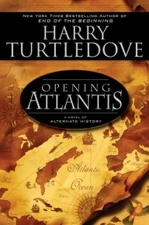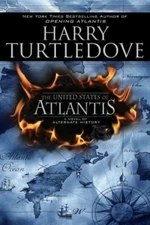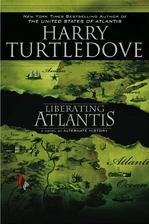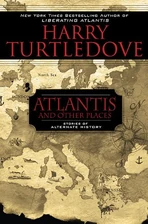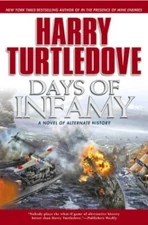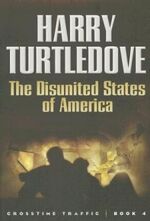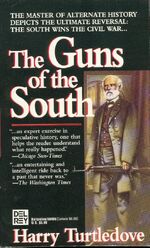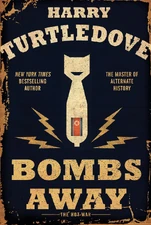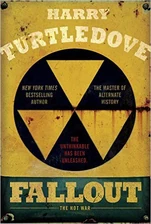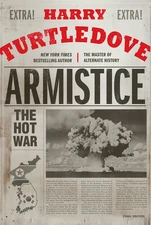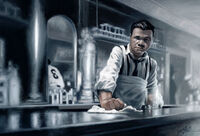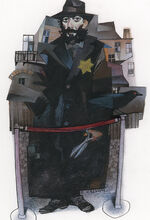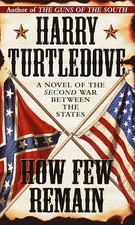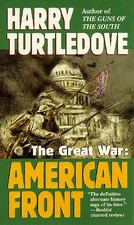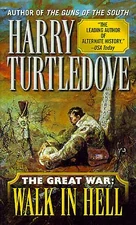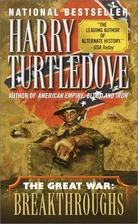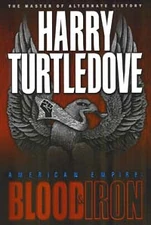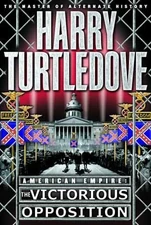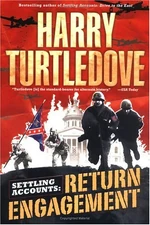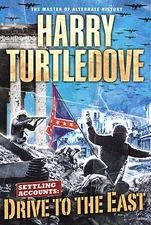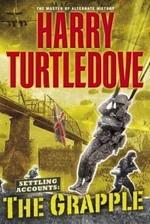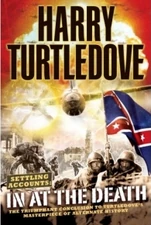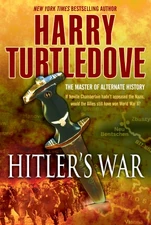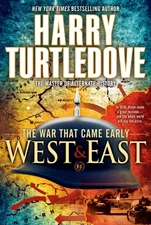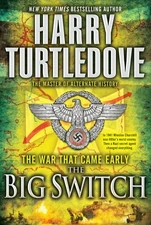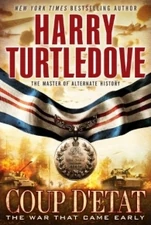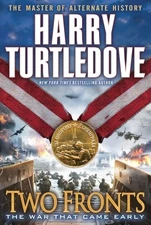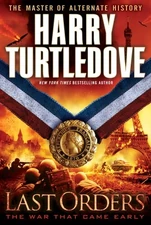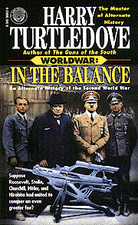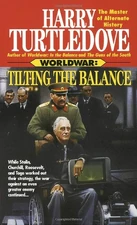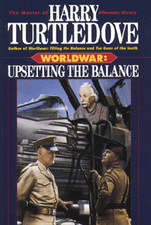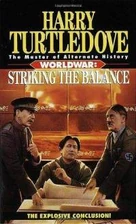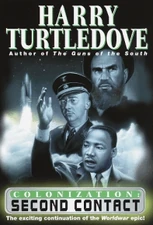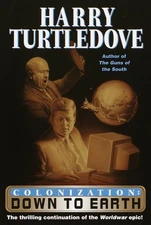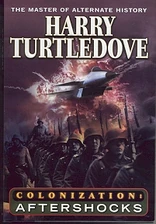No edit summary |
|||
| (38 intermediate revisions by 6 users not shown) | |||
| Line 1: | Line 1: | ||
| + | {{Infobox Country |
||
| ⚫ | |||
| + | |name = Germany |
||
| − | [[Image:Germany-map.jpg|right|thumb]] |
||
| + | |image_map = Germany-map.jpg |
||
| ⚫ | [[Image:Germany_1870.png|thumb|right|The flag of the German Empire, which was used from 1867-1918 and from 1933-1935 as a co-national flag alongside the swastika flag in [[OTL]]; it remained in use after those times in [[Southern Victory]], ''[[Curious Notions (novel)|Curious Notions]]'' and "[[Uncle Alf]]". In [[The War That Came Early]], this flag was restored in 1944.]][[Image:Worldwar_Germany.jpg|thumb|right|The [[Nazi]] swastika, used as the German flag from 1933-1945. In a number of [[Harry Turtledove]] works, the flag remained in use after 1945, and even into the 21st Century. In [[The War That Came Early]], the [[Nazi Party (The War That Came Early)|Nazis]] are [[1944 German Civil War|overthrown in 1944]], and the swastika was replaced with the flag of the German Empire.]] |
||
| + | |image_flag = ModernGermanyFlag.png |
||
| ⚫ | '''The Federal Republic of Germany''' is a country in West-central [[Europe]]. It is bordered to the north by the North Sea, [[Denmark]], and the Baltic Sea; to the east by [[Poland]] and the [[Czech]] Republic; to the south by [[Austria]] and [[Switzerland]]; and to the west by [[France]], [[Luxembourg]], [[Belgium]], and the [[Netherlands]]. |
||
| + | |continent = [[Europe]] |
||
| + | |capital = [[Berlin]] |
||
| + | |national language = German |
||
| + | |government = Federal parliamentary republic |
||
| + | |OTL status = Active}} |
||
| ⚫ | '''The Federal Republic of Germany''' is a country in West-central [[Europe]]. It is bordered to the north by the [[North Sea]], [[Denmark]], and the Baltic Sea; to the east by [[Poland]] and the [[Czech]] Republic; to the south by [[Austria]] and [[Switzerland]]; and to the west by [[France]], [[Luxembourg]], [[Belgium]], and the [[Netherlands]]. |
||
A region referred to as "[[Germania]]" inhabited by several tribes was known and documented before AD 100. Despite the [[Battle of the Teutoburg Forest|best efforts]] of the [[Roman Empire]], this region was never subdued or annexed. Eventually, [[Germanic tribes]] played a role in the fall of the Roman Empire. |
A region referred to as "[[Germania]]" inhabited by several tribes was known and documented before AD 100. Despite the [[Battle of the Teutoburg Forest|best efforts]] of the [[Roman Empire]], this region was never subdued or annexed. Eventually, [[Germanic tribes]] played a role in the fall of the Roman Empire. |
||
| Line 16: | Line 22: | ||
In 1949, Germany was divided into two separate states — [[East Germany]] and [[West Germany]] — along the lines of [[Allied]] occupation, with the [[Soviet Union]] dominating the East, and the Western Allies, the [[United States]] in particular, dominating the West. The two states were reunited into a federal parliamentary republic in 1990. Germany has become the most populous country in Western Europe and has one of the largest economies on the globe. |
In 1949, Germany was divided into two separate states — [[East Germany]] and [[West Germany]] — along the lines of [[Allied]] occupation, with the [[Soviet Union]] dominating the East, and the Western Allies, the [[United States]] in particular, dominating the West. The two states were reunited into a federal parliamentary republic in 1990. Germany has become the most populous country in Western Europe and has one of the largest economies on the globe. |
||
| ⚫ | |||
| ⚫ | |||
| ⚫ | [[Image:Germany_1870.png|thumb|right|The flag of the German Empire, which was used from 1867-1918 and from 1933-1935 as a co-national flag alongside the swastika flag in [[OTL]]; it remained in use after those times in [[Southern Victory]], ''[[Curious Notions (novel)|Curious Notions]]'' and "[[Uncle Alf]]". In [[The War That Came Early]], this flag was restored in 1944.]][[Image:Worldwar_Germany.jpg|thumb|right|The [[Nazi]] swastika, used as the German flag from 1933-1945. In a number of [[Harry Turtledove]] works, the flag remained in use after 1945, and even into the 21st Century. In [[The War That Came Early]], the [[Nazi Party (The War That Came Early)|Nazis]] are [[1944 German Civil War|overthrown in 1944]], and the swastika was replaced with the flag of the German Empire.]] |
||
| + | |||
| ⚫ | |||
The vast majority of [[Harry Turtledove]] works involving Germany depict a version of the Third ''Reich''. A smaller number depict a version of the ''Kaiserreich''. The Weimar Republic has never been a Turtledove setting, but is often referenced in stories involving the Nazis. |
The vast majority of [[Harry Turtledove]] works involving Germany depict a version of the Third ''Reich''. A smaller number depict a version of the ''Kaiserreich''. The Weimar Republic has never been a Turtledove setting, but is often referenced in stories involving the Nazis. |
||
| + | |||
| + | ==Germany in [[Atlantis Series|Atlantis]]== |
||
| + | Mercenaries from a number of '''German states''', including Hesse and Braunschweig, fought for [[Britain (Atlantis)|England]] during the [[Atlantean War of Independence]]. |
||
==Germany in ''[[The Case of the Toxic Spell Dump]]''== |
==Germany in ''[[The Case of the Toxic Spell Dump]]''== |
||
| Line 23: | Line 35: | ||
==Germany in "[[The Catcher in the Rhine]]"== |
==Germany in "[[The Catcher in the Rhine]]"== |
||
| − | While traveling through '''Germany''', a young [[American]] [[Hagen Kriemheld|tourist]] encountered the mythical dwarf [[Regin Fafnirsbruder]], who transported the young man to the past, and ordered him to "save" the enchanted Valkyrie [[Brunhild]].<ref>See, e.g., ''[[Atlantis and Other Places]]'', pgs. 124-131, HC.</ref> |
+ | While traveling through '''Germany''', a young [[American]] [[Hagen Kriemheld|tourist]] encountered the mythical dwarf [[Regin Fafnirsbruder]], who transported the young man to the past, and ordered him to "save" the enchanted [[Valkyrie]] [[Brunhild]].<ref>See, e.g., ''[[Atlantis and Other Places]]'', pgs. 124-131, HC.</ref> |
| + | |||
| + | ==Germany in "[[Christmas Truce (story)|Christmas Truce]]"== |
||
| + | Soldiers from the '''German Empire''' participated in the [[Christmas|Christmas Day]] [[Christmas Truce (Christmas Truce)|truce]] in 1914 that brought the [[World War I|Great War]] to a halt for the day. Unfortunately, a ''Gefreiter'' named [[Adolf Hitler (Christmas Truce)|Adolf Hitler]] became enraged by the fraternization, and killed [[United Kingdom (Christmas Truce)|British]] [[Alec (Christmas Truce)|officer]] in an attempt to end the truce. Hitler and was promptly killed by British lieutenant [[Bill Meadows]]. The German officer present, [[Franz Wormser]] was able to keep the truce going with Meadows' help, despite the tragedy.<ref>''Asimov's Science Fiction'', November/December, 2019, Vol. 43 Nos. 11 & 12, pgs. 50-51.</ref> |
||
| − | ==Germany in [[Crosstime Traffic |
+ | ==Germany in [[Crosstime Traffic Series|Crosstime Traffic]]== |
In the [[home timeline]], '''Germany''' was a member of the [[European Union (Crosstime Traffic)|European Union]]. There were several [[alternate]]s where Germany had won [[World War II (Crosstime Traffic)|World War II]]. These were deemed particularly terrible. In some of them, the [[Axis (Crosstime Traffic)|Axis]] had conquered the [[United States (Crosstime Traffic)|United States]]. The [[Crosstime Traffic (company)|Crosstime Traffic]] employee [[Eduardo Caruso]] considered these alternates to be "only slightly worse" than one in which the [[Soviet Union (The Gladiator)|Soviet Union]] won the [[Cold War (The Gladiator)|Cold War]].<ref>[[The Gladiator (novel)|''The Gladiator'']], pg. 262.</ref> In one of these alternates, Nazi Germany was responsible for starting a devastating [[Atomic bomb (Crosstime Traffic)|nuclear war]]. |
In the [[home timeline]], '''Germany''' was a member of the [[European Union (Crosstime Traffic)|European Union]]. There were several [[alternate]]s where Germany had won [[World War II (Crosstime Traffic)|World War II]]. These were deemed particularly terrible. In some of them, the [[Axis (Crosstime Traffic)|Axis]] had conquered the [[United States (Crosstime Traffic)|United States]]. The [[Crosstime Traffic (company)|Crosstime Traffic]] employee [[Eduardo Caruso]] considered these alternates to be "only slightly worse" than one in which the [[Soviet Union (The Gladiator)|Soviet Union]] won the [[Cold War (The Gladiator)|Cold War]].<ref>[[The Gladiator (novel)|''The Gladiator'']], pg. 262.</ref> In one of these alternates, Nazi Germany was responsible for starting a devastating [[Atomic bomb (Crosstime Traffic)|nuclear war]]. |
||
| Line 41: | Line 56: | ||
===Germany in [[The Gladiator (novel)|''The Gladiator'']]=== |
===Germany in [[The Gladiator (novel)|''The Gladiator'']]=== |
||
| − | '''Germany''' was divided between the victorious [[Allied Forces]] after [[World War II (The Gladiator)|World War II]]. When the [[Soviet Union (The Gladiator)|Soviet Union]] won the [[Cold War (The Gladiator)|Cold War]] in the 20th century, Germany |
+ | '''Germany''' was divided between the victorious [[Allied Forces]] after [[World War II (The Gladiator)|World War II]]. When the [[Soviet Union (The Gladiator)|Soviet Union]] won the [[Cold War (The Gladiator)|Cold War]] in the 20th century, [[West Germany (The Gladiator)|West]] and [[Germany (The Gladiator)|East Germany]] were reunified under a single [[Communism (The Gladiator)|communist]] government. |
While Germany was one of the countries most devoted to [[Karl Marx (The Gladiator)|Marxism]], the Soviet Union nonetheless kept a tight control on Germany, a country that had invaded [[Russia]]n territory twice in a generation. |
While Germany was one of the countries most devoted to [[Karl Marx (The Gladiator)|Marxism]], the Soviet Union nonetheless kept a tight control on Germany, a country that had invaded [[Russia]]n territory twice in a generation. |
||
| − | The Germans made the Trabant automobile, which was notorious for its dirty emissions. |
+ | The Germans made the [[Trabant]] automobile, which was notorious for its dirty emissions. |
===Germany in ''[[In High Places]]''=== |
===Germany in ''[[In High Places]]''=== |
||
| Line 64: | Line 79: | ||
==Germany in "[[Drang von Osten]]"== |
==Germany in "[[Drang von Osten]]"== |
||
In 2041, '''Germany''' led a coalition of various [[European]] countries to meet [[China (Drang von Osten)|China's]] invasion of [[Russia (Drang von Osten)|Russia]] the same year. While the coalition was initially successful in meeting the invasion in European Russia, by 2043, the German lines were collapsing, and Chinese troops were making their way into [[Ukraine (Drang von Osten)|Ukraine]].<ref>See, e.g., ''[[We Install and Other Stories]]'', loc. 417-820.</ref> |
In 2041, '''Germany''' led a coalition of various [[European]] countries to meet [[China (Drang von Osten)|China's]] invasion of [[Russia (Drang von Osten)|Russia]] the same year. While the coalition was initially successful in meeting the invasion in European Russia, by 2043, the German lines were collapsing, and Chinese troops were making their way into [[Ukraine (Drang von Osten)|Ukraine]].<ref>See, e.g., ''[[We Install and Other Stories]]'', loc. 417-820.</ref> |
||
| + | |||
| + | ==Germany in "[[The Garden Gnome Freedom Front]]"== |
||
| + | Most of the [[Garden gnome (The Garden Gnome Freedom Front)|garden gnomes]] of [[Saint-Clément, Normandy]], were manufactured in '''Germany''', but considered themselves naturalized [[france (The Garden Gnome Freedom Front)|French]] gnomes. |
||
| + | |||
| + | In the 20th century, the [[human]]s of [[Europe]] fought [[World War I]] and [[World War II]]. [[Otto (garden gnome)|Otto]], a German-made gnome of Saint-Clément, sympathized with his adopted France rather than his native Germany in the first war, and actively intervened against a [[German sniper (The Garden Gnome Freedom Front)|German soldier]] in the second. The reports provided by the former [[Garden Gnome Freedom Front]] suggest that numerous other gnomes took similar action under like circumstances during that war. |
||
==Germany in ''[[The Guns of the South]]''== |
==Germany in ''[[The Guns of the South]]''== |
||
| − | The [[America Will Break]] men spoke to each other in a [[Afrikaans (The Guns of the South)|strange guttural language]] which caused some [[Confederate States (The Guns of the South)|Confederates]] to believe they were '''Germans'''. However, [[Avram Goldfarb]], a native of ''' |
+ | The [[America Will Break]] men spoke to each other in a [[Afrikaans (The Guns of the South)|strange guttural language]] which caused some [[Confederate States (The Guns of the South)|Confederates]] to believe they were '''Germans'''. However, [[Avram Goldfarb]], a native of '''German''' Kingdom of [[Prussia]], examined [[The Afrikaner Resistance Movement: What It Is|a book written in their language]], and found that it was not German, though it closely resembled it. This and other captured documents indicated that the AWB men admired certain German figures and institutions from [[OTL|their 20th century's history]], including a disagreeable man named [[Adolf Hitler]]. |
==Germany in [[The Hot War]]== |
==Germany in [[The Hot War]]== |
||
| − | '''Germany''' was divided between the Western [[Allies]] ([[United States (The Hot War)|the U.S.]], the [[United Kingdom (The Hot War)|U.K.]], and [[France (The Hot War)|France]]) and the [[Soviet Union (The Hot War)|Soviet Union]] after [[World War II (The Hot War)|World War II]], yielding two new states, [[West Germany (The Hot War)|West Germany]] and [[East Germany (The Hot War)|East Germany]]. However, when [[World War III (The Hot War)|World War III]] broke out in February 1951, the Soviet Union's primary goal was to occupy and reunify Germany under [[communism (The Hot War)|communist]] rule. |
+ | '''Germany''' was divided between the Western [[Allies]] ([[United States of America (The Hot War)|the U.S.]], the [[United Kingdom (The Hot War)|U.K.]], and [[France (The Hot War)|France]]) and the [[Soviet Union (The Hot War)|Soviet Union]] after [[World War II (The Hot War)|World War II]], yielding two new states, [[West Germany (The Hot War)|West Germany]] and [[East Germany (The Hot War)|East Germany]]. However, when [[World War III (The Hot War)|World War III]] broke out in February 1951, the Soviet Union's primary goal was to occupy and reunify Germany under [[communism (The Hot War)|communist]] rule. |
| + | The war ended in July, 1952 with the ''status quo antebellum'' restored. West Germany was completely smashed by the fighting, whereas East Germany was only moderately bombed. |
||
| ⚫ | |||
==Germany in "[[The House That George Built]]"== |
==Germany in "[[The House That George Built]]"== |
||
| Line 100: | Line 120: | ||
Buckliger took both of these attacks in stride, meeting them in moderate tones, and exhorting the people to continue on the path he'd set them on. Shortly after he returned from abroad, Buckliger gave a speech at [[Friedrich Wilhelm University]], where he proclaimed the [[Reichstag (In the Presence of Mine Enemies)|''Reichstag'']] a mere rubber-stamp for the ''Reich'', that there would be free and fair [[Reichstag Elections of 2011 (In the Presence of Mine Enemies)|elections to be held on 10 July 2011]]. |
Buckliger took both of these attacks in stride, meeting them in moderate tones, and exhorting the people to continue on the path he'd set them on. Shortly after he returned from abroad, Buckliger gave a speech at [[Friedrich Wilhelm University]], where he proclaimed the [[Reichstag (In the Presence of Mine Enemies)|''Reichstag'']] a mere rubber-stamp for the ''Reich'', that there would be free and fair [[Reichstag Elections of 2011 (In the Presence of Mine Enemies)|elections to be held on 10 July 2011]]. |
||
| − | Events came to a head when Prützmann (under the guise of the [[Committee for the Salvation of the Greater German Reich]]) initiated a ''[[2011 Putsch|Putsch]]'' in 2011. Buckliger and his wife, [[Erna Buckliger|Erna]] |
+ | Events came to a head when Prützmann (under the guise of the [[State Committee for the Salvation of the Greater German Reich]]) initiated a ''[[2011 Putsch|Putsch]]'' in 2011. The SS placed Buckliger and his wife, [[Erna Buckliger|Erna]] under house-arrest in their vacation home in [[Croatia (In the Presence of Mine Enemies)|Croatia]]. Minor bureaucrat [[Odilo Globocnik]] was made ''Führer''. The ''[[Wehrmacht (In the Presence of Mine Enemies)|Wehrmacht]]'' quickly sided with Buckliger. Global opinion also decried the ''putsch'', and the German people took to the streets to protest the SS.<ref>Ibid., pg. 423.</ref> Moreover, Rolf Stolle defiantly and bombastically refused to be arrested, gathering the people of Berlin to his banner. While popular support was already against the SS, rumors that Prützmann was Jewish expedited the ''putsch''s' collapse. Prützmann committed suicide, Globocnik was beaten and killed by an enraged mob, and the Wehrmacht moped up the ''putsch''. Stolle became a national hero. Upon his return, Buckliger's relationship with Stolle changed. The ''Führer'' no longer had the stature in the eyes of the people, and Stolle had more legitimacy. |
Sunday, 10 July 2011 saw the largest voter turnout the country had known in decades. With the people mobilized, the reformers won the majority, and the ''Reich'' took the first steps on the slow march to reform. |
Sunday, 10 July 2011 saw the largest voter turnout the country had known in decades. With the people mobilized, the reformers won the majority, and the ''Reich'' took the first steps on the slow march to reform. |
||
| Line 109: | Line 129: | ||
The ''führer'' served as both head of state and government for the ''Reich''. The ''führer'' was the absolute ruler of the country, and enjoyed absolute obedience, irrespective of who actually held the office.<ref>''[[In the Presence of Mine Enemies (novel)|In the Presence of Mine Enemies]]'', pg. 117.</ref> Despite their substantial power, the ''führer'' did designate a successor. Instead, officials within the government selected a new ''führer'' upon the death of the incumbent.<ref>Ibid., pg. 83-114.</ref> |
The ''führer'' served as both head of state and government for the ''Reich''. The ''führer'' was the absolute ruler of the country, and enjoyed absolute obedience, irrespective of who actually held the office.<ref>''[[In the Presence of Mine Enemies (novel)|In the Presence of Mine Enemies]]'', pg. 117.</ref> Despite their substantial power, the ''führer'' did designate a successor. Instead, officials within the government selected a new ''führer'' upon the death of the incumbent.<ref>Ibid., pg. 83-114.</ref> |
||
| − | As its name implies, the Air and Space Ministry was responsible for air and space travel. This included manned tripped to [[Mars#Mars in In the Presence of Mine Enemies|Mars]],<ref>Ibid., |
+ | As its name implies, the Air and Space Ministry was responsible for air and space travel. This included manned tripped to [[Mars#Mars in In the Presence of Mine Enemies|Mars]],<ref>Ibid., pg. 85-86.</ref> and planned trips to [[Jupiter#Jupiter in In the Presence of Mine Enemies|Jupiter]].<ref>Ibid.</ref> [[Hermann Göring (In the Presence of Mine Enemies)|Hermann Göring]] was the first ''de facto'' head the ministry. His influence was so dominant that the headquarters of the Air and Space Ministry was still known as the ''Reichsmarschall's'' Office in 2010, almost 50 years after his death. The roof of the Ministry was covered in elaborate gardens and grass, as a venue for his notorious orgies.<ref>Ibid., pg. 4.</ref> |
The Justice Ministry was probably the most feared agency in Germany.<ref>Ibid., pg 5.</ref> It oversaw the [[Security Police of Nazi Germany (In the Presence of Mine Enemies)|Security Police]], including the [[SS (In the Presence of Mine Enemies)|SS]] and the [[Gestapo#Gestapo in In the Presence of Mine Enemies|Gestapo]]. |
The Justice Ministry was probably the most feared agency in Germany.<ref>Ibid., pg 5.</ref> It oversaw the [[Security Police of Nazi Germany (In the Presence of Mine Enemies)|Security Police]], including the [[SS (In the Presence of Mine Enemies)|SS]] and the [[Gestapo#Gestapo in In the Presence of Mine Enemies|Gestapo]]. |
||
| Line 122: | Line 142: | ||
===Education=== |
===Education=== |
||
| − | The ''Reich''' |
+ | The ''Reich's'' education system was completely subordinate to the Nazi ideology at every level. Grammar school required students to regurgitate "facts" that usually emphasized the grandeur of the state, the supremacy of the German race, and the "inferiority" of the [[Jews (In the Presence of Mine Enemies)|Jews]]. Compliance with the state was deeply ingrained in students as they advanced through the grades. Poor students were subject to corporal punishment. |
At the university level, things were much the same. [[Friedrich Wilhelm University]] was home of the Institute of Racial Studies, which classified [[Jews (In the Presence of Mine Enemies)|Jews]], [[Roma (In the Presence of Mine Enemies)|Gypsies]], [[Slavs (In the Presence of Mine Enemies)|Slavs]], [[Arabs (In the Presence of Mine Enemies)|Arabs]] and [[black people (In the Presence of Mine Enemies)|Blacks]] as inferior while [[Iran (In the Presence of Mine Enemies)|Persians]] and [[India (In the Presence of Mine Enemies)|Indians]] were classified as Aryan.<ref>''[[In the Presence of Mine Enemies (novel)|In the Presence of Mine Enemies]]'', pg. 34-35, HC.</ref> |
At the university level, things were much the same. [[Friedrich Wilhelm University]] was home of the Institute of Racial Studies, which classified [[Jews (In the Presence of Mine Enemies)|Jews]], [[Roma (In the Presence of Mine Enemies)|Gypsies]], [[Slavs (In the Presence of Mine Enemies)|Slavs]], [[Arabs (In the Presence of Mine Enemies)|Arabs]] and [[black people (In the Presence of Mine Enemies)|Blacks]] as inferior while [[Iran (In the Presence of Mine Enemies)|Persians]] and [[India (In the Presence of Mine Enemies)|Indians]] were classified as Aryan.<ref>''[[In the Presence of Mine Enemies (novel)|In the Presence of Mine Enemies]]'', pg. 34-35, HC.</ref> |
||
| Line 178: | Line 198: | ||
It was generally believed that Germany and Japan's next target would be the United States. |
It was generally believed that Germany and Japan's next target would be the United States. |
||
| − | ==Germany in "[[ |
+ | ==Germany in "[[A Late Symmer Night's Battle]]"== |
| + | '''Germany''' was the native land of [[Kobold (A Late Symmer Night's Battle)|kobolds]]. One kobold tribe left Germany to run a mining operation in northern [[Greece (A Late Symmer Night's Battle)|Greece]]. Evicted by local [[human]]s, they turned their eyes to the [[Faerie (A Late Symmer Night's Battle)|Faerie]] kingdom ruled by [[Oberon (A Late Symmer Night's Battle)|Oberon]] and [[Titania (A Late Symmer Night's Battle)|Titania]]. |
||
| − | [[Nazi]] '''Germany''' was defeated and occupied by the [https://en.wikipedia.org/wiki/The_Domination Domination of the Draka] in the [https://en.wikipedia.org/wiki/The_Domination#The_Eurasian_War Eurasian War] of the 1940s. The victors proceeded to reduce the entire population of Germany, indeed all of Europe, to [https://en.wikipedia.org/wiki/The_Domination#Citizens_and_.22serfs.22 serfdom]. Germans were sold ''en masse'' to the highest bidder in the new slave markets which the Draka set up out throughout the country. There was no hope for German serfs to ever emerge from that status, since Draka law did not recognize the possibility of manumission. However, joining the ranks of the Yanicharies, the serf-soldiers fighting in the Drakas' wars, offered the possibility of slightly better conditions than those of other serfs. |
||
| ⚫ | |||
| − | |||
| − | There were Germans among the Yanicharies who were sent across the Atlantic after the Draka victory in the [https://en.wikipedia.org/wiki/The_Domination#Draka_victorious Final War of 1998], charged with crushing the remaining opposition in what had been the United States. The Draka had no objection to Yanicharies raping women, looting and keeping their loot to themselves. However, the American guerrillas proved far better armed and organized than the Draka generals expected, and a large part of the German Yanicharies never saw Germany again. |
||
==Germany in ''[[The Man With the Iron Heart]]''== |
==Germany in ''[[The Man With the Iron Heart]]''== |
||
| Line 210: | Line 229: | ||
==Germany in "[[Ready for the Fatherland]]"== |
==Germany in "[[Ready for the Fatherland]]"== |
||
| − | '''Germany''' was able to negotiate a separate peace with the [[Soviet Union (Ready for the Fatherland)|Soviet Union]] after General [[Erich von Manstein (Ready for the Fatherland)|Erich von Manstein]] shot and killed [[Adolf Hitler (Ready for the Fatherland)|Adolf Hitler]] on 19 February 1943. Manstein became Germany's leader and oversaw the consolidation of its power in [[Europe (Ready for the Fatherland)|Europe]], repelling the [[Allied Forces (Ready for the Fatherland)|Allied]] invasions of [[Italy (Ready for the Fatherland)|Italy]] and [[France (Ready for the Fatherland)|France]]. In 1953, an exchange of [[ |
+ | '''Germany''' was able to negotiate a separate peace with the [[Soviet Union (Ready for the Fatherland)|Soviet Union]] after General [[Erich von Manstein (Ready for the Fatherland)|Erich von Manstein]] shot and killed [[Adolf Hitler (Ready for the Fatherland)|Adolf Hitler]] on 19 February 1943. Manstein became Germany's leader and oversaw the consolidation of its power in [[Europe (Ready for the Fatherland)|Europe]], repelling the [[Allied Forces (Ready for the Fatherland)|Allied]] invasions of [[Italy (Ready for the Fatherland)|Italy]] and [[France (Ready for the Fatherland)|France]]. In 1953, an exchange of [[Sunbomb (Ready for the Fatherland)|sunbombs]] in [[Japan (Ready for the Fatherland)|Japan]] nearly brought the [[United States (Ready for the Fatherland)|United States]] and the Soviet Union to war. Manstein was able to mediate a ceasefire. [[Joseph Stalin (Ready for the Fatherland)|Joseph Stalin's]] timely death also helped diffuse the situation. |
In 1979, as the Soviet Union threatened [[Britain (Ready for the Fatherland)|British]] oil resources in the [[Middle East (Ready for the Fatherland)|Middle East]], Britain opened up a dialogue with Germany, which was making claims to oil in the North Sea. At the behest of the German government, the British secret service helped the government of [[Croatia (Ready for the Fatherland)|Croatia]] capture a [[Serbs (Ready for the Fatherland)|Serb]] partisan, in exchange for unfettered access to the North Sea oil. |
In 1979, as the Soviet Union threatened [[Britain (Ready for the Fatherland)|British]] oil resources in the [[Middle East (Ready for the Fatherland)|Middle East]], Britain opened up a dialogue with Germany, which was making claims to oil in the North Sea. At the behest of the German government, the British secret service helped the government of [[Croatia (Ready for the Fatherland)|Croatia]] capture a [[Serbs (Ready for the Fatherland)|Serb]] partisan, in exchange for unfettered access to the North Sea oil. |
||
| Line 220: | Line 239: | ||
== Germany in [[Southern Victory]] == |
== Germany in [[Southern Victory]] == |
||
| − | [[Image:GermanEmpire.png|left|thumb]] |
+ | [[Image:GermanEmpire.png|left|thumb|Map of the German Empire]] |
| − | '''Germany''' had unified around [[Prussia]] by 1870, following a series of wars, including with its |
+ | '''Germany''' had unified around [[Prussia]] by 1870, following a series of wars, including with its neighbor [[France (Southern Victory)|France]]. After the [[United States of America (Southern Victory)|United States]] was defeated by the [[Confederate States (Southern Victory)|Confederate States]], [[Britain (Southern Victory)|Britain]], and France in the [[Second Mexican War]] (1881-2), Germany developed an important alliance, later known as the [[Central Powers (Southern Victory)|Central Powers]], with the U.S.A. The United States emulated German military and social organization (people had to line up for manufactured goods and coal, universal conscription was established, and bureaucracy became rampant) to make itself better able to oppose the Confederacy. |
===The [[Great War]]=== |
===The [[Great War]]=== |
||
| Line 228: | Line 247: | ||
During the war, the Germans developed numerous weapons innovations, including [[Poison gas (Southern Victory)|poison gas]] and a variety of aeroplanes. They shared these with the United States, which in turn taught Germany to build [[barrel]]s, helmets, and light machine guns. Germany also supported the [[Russian Revolution (Southern Victory)|Russian Revolution]] and the separatist uprising in [[Ireland (Southern Victory)|Ireland]], and established a state in [[Poland (Southern Victory)|Poland]] on former Russian territory. |
During the war, the Germans developed numerous weapons innovations, including [[Poison gas (Southern Victory)|poison gas]] and a variety of aeroplanes. They shared these with the United States, which in turn taught Germany to build [[barrel]]s, helmets, and light machine guns. Germany also supported the [[Russian Revolution (Southern Victory)|Russian Revolution]] and the separatist uprising in [[Ireland (Southern Victory)|Ireland]], and established a state in [[Poland (Southern Victory)|Poland]] on former Russian territory. |
||
| − | Following several years of stalemate, Germany defeated France and, with help from the US, Britain. It thus established itself as the dominant power in Europe, occupying [[Belgium (Southern Victory)|Belgium]] and the [[Ukraine (Southern Victory)|Ukraine]], annexing the former French province of [[Lorraine (Southern Victory)|Lorraine]] and the [[Belgian Congo (Southern Victory)|Belgian Congo]]. It recognized the [[Republic of Quebec]], a new nation the US had carved out of defeated [[Canada (Southern Victory)|Canada]]. |
+ | Following several years of stalemate, Germany defeated France and, with help from the US, Britain. It thus established itself as the dominant power in Europe, occupying [[Belgium (Southern Victory)|Belgium]] and the [[Ukraine (Southern Victory)|Ukraine]], annexing the former French province of [[Lorraine (Southern Victory)|Lorraine]] and the [[Belgian Congo (Southern Victory)|Belgian Congo]]. It recognized the [[Quebec (Southern Victory)|Republic of Quebec]], a new nation the US had carved out of defeated [[Canada (Southern Victory)|Canada]]. |
===Interwar Years=== |
===Interwar Years=== |
||
Its period of dominance was short-lived, however, and was marked by elevated tensions with the US. The two victors cooperated in a joint naval operation to block British interference in the Republic of Ireland, but throughout the 1920s many people from both countries believed that a US-German conflict was not out of the question. |
Its period of dominance was short-lived, however, and was marked by elevated tensions with the US. The two victors cooperated in a joint naval operation to block British interference in the Republic of Ireland, but throughout the 1920s many people from both countries believed that a US-German conflict was not out of the question. |
||
| − | While tensions with the US eased during the 1930s, Germany suffered a string of setbacks in Europe. The Germans were unable to prevent the hostile [[Action Francaise (Southern Victory)|Action Francaise]] from coming to power in France or the [[Silver Shirts]] from joining the ruling Conservatives in Britain. Bolshevik revolutionaries in Russia were [[Russian Civil War (Southern Victory)|crushed by |
+ | While tensions with the US eased during the 1930s, Germany suffered a string of setbacks in Europe. The Germans were unable to prevent the hostile [[Action Francaise (Southern Victory)|Action Francaise]] from coming to power in France or the [[Silver Shirts]] from joining the ruling Conservatives in Britain. Bolshevik revolutionaries in Russia were [[Russian Civil War (Southern Victory)|crushed by loyalists]] of [[Nicholas II (Southern Victory)|Tsar Nicholas II]], Austria-Hungary grew increasingly unstable, and strong Anglo-French support for the [[Spanish Nationalists (Southern Victory)|Nationalists]] allowed them to triumph over the German-backed [[Spanish Monarchists (Southern Victory)|Monarchists]] in the [[Spanish Civil War (Southern Victory)|Spanish Civil War]]. |
When Kaiser Wilhelm II died in 1941, his son [[Wilhelm III]] faced a renewed war with the revitalized Entente. Wilhelm III's perceived weakness encouraged the British and French to invade Belgium and [[Alsace-Lorraine (Southern Victory)|Alsace-Lorraine]], and within a matter of weeks the ensuing war had spread to [[Eastern Europe (Southern Victory)|Eastern Europe]] and North America. |
When Kaiser Wilhelm II died in 1941, his son [[Wilhelm III]] faced a renewed war with the revitalized Entente. Wilhelm III's perceived weakness encouraged the British and French to invade Belgium and [[Alsace-Lorraine (Southern Victory)|Alsace-Lorraine]], and within a matter of weeks the ensuing war had spread to [[Eastern Europe (Southern Victory)|Eastern Europe]] and North America. |
||
| Line 247: | Line 266: | ||
The German response would wait until June, when three superbombs were dropped near-simultaneously on [[London (Southern Victory)|London]], [[Brighton (Southern Victory)|Brighton]], and [[Norwich (Southern Victory)|Norwich]], along with a broadcast warning that Germany had more bombs and would use them. [[Prime Minister of the United Kingdom#Southern Victory|Prime Minister]] [[Winston Churchill (Southern Victory)|Winston Churchill]], who had fled London along with the [[House of Windsor|British royal family]] after the Hamburg bomb, boasted that Britain would take immediate vengeance. He sent Britain's second superbomb on its way into Germany, but the plane was shot down over Belgium by German turbo-powered night fighters. Having no more bombs in its arsenal, the Churchill government fell and Britain sued for peace, as did France in turn. With her western foes essentially eviscerated, Germany's attentions for the latter half of the 20th Century turned back to Russia. Fearing its longtime foe might develop its own superbomb, Germany agreed to the doctrine formulated by [[President of the United States (Southern Victory)|U.S. President]] [[Thomas Dewey (Southern Victory)|Thomas Dewey]], in which both countries would police the world to prevent other countries from obtaining their own superbombs. |
The German response would wait until June, when three superbombs were dropped near-simultaneously on [[London (Southern Victory)|London]], [[Brighton (Southern Victory)|Brighton]], and [[Norwich (Southern Victory)|Norwich]], along with a broadcast warning that Germany had more bombs and would use them. [[Prime Minister of the United Kingdom#Southern Victory|Prime Minister]] [[Winston Churchill (Southern Victory)|Winston Churchill]], who had fled London along with the [[House of Windsor|British royal family]] after the Hamburg bomb, boasted that Britain would take immediate vengeance. He sent Britain's second superbomb on its way into Germany, but the plane was shot down over Belgium by German turbo-powered night fighters. Having no more bombs in its arsenal, the Churchill government fell and Britain sued for peace, as did France in turn. With her western foes essentially eviscerated, Germany's attentions for the latter half of the 20th Century turned back to Russia. Fearing its longtime foe might develop its own superbomb, Germany agreed to the doctrine formulated by [[President of the United States (Southern Victory)|U.S. President]] [[Thomas Dewey (Southern Victory)|Thomas Dewey]], in which both countries would police the world to prevent other countries from obtaining their own superbombs. |
||
| + | |||
| + | ==Germany in ''[[Through Darkest Europe]]''== |
||
| + | On paper, '''Germany''' was a united empire. In fact, however, the [[German Emperor#Other Emperors|Emperors]] had no power, and the disparate German states remained autonomous in practice. |
||
| + | |||
| + | Italians traditionally regarded Germans as savage and uncouth, a cultural quirk which worked to the advantage of the government of the [[Grand Duchy of Italy]] in 2018. When a number of Germans were among the [[Aquinists]] who incited violence throughout Italy, the government put out propaganda linking Aquinism with Germanness. |
||
==Germany in [[The Two Georges (novel)|''The Two Georges'']]== |
==Germany in [[The Two Georges (novel)|''The Two Georges'']]== |
||
| Line 347: | Line 371: | ||
==Germany in "[[Zigeuner (story)|Zigeuner]]"== |
==Germany in "[[Zigeuner (story)|Zigeuner]]"== |
||
| − | During his rise to power in '''Germany''', [[Adolf Hitler (Zigeuner)|Adolf Hitler]] claimed that while his division was fighting the [[Russia (Zigeuner)|Russian Empire]] in [[World War I (Zigeuner)|World War I]], they also had to contend with the [[Romani (Zigeuner)|''Zigeuner'']] people. Hitler claimed that the ''Zigeuner'' stole |
+ | During his rise to power in '''Germany''', [[Adolf Hitler (Zigeuner)|Adolf Hitler]] claimed that while his division was fighting the [[Russia (Zigeuner)|Russian Empire]] in [[World War I (Zigeuner)|World War I]], they also had to contend with the [[Romani (Zigeuner)|''Zigeuner'']] people. Hitler claimed that the ''Zigeuner'' stole [[horse]]s and boots and [[telegraph]] wire, helping to cause unnecessary German casualties.<ref>''Asimov's Science Fiction'', September/October, 2017, Vol. 41 Nos. 9 & 10, pg. 94-95.</ref> At the same time, Hitler also saw how badly the Russians treated the [[Jews (Zigeuner)|Jews]] they found in the [[Austro-Hungarian]] provinces they overran. Hitler already hated the Russians, and their anti-Semitism left him sympathetic to the Jews.<ref>Ibid., pg. 100.</ref> |
| − | Upon his ascendancy, Hitler declared ''Zigeuner'' to be ''Untermenschen'', along with Bolsheviks and homosexuals.<ref>Ibid., pg. 99.</ref> With the outbreak of [[World War II (Zigeuner)|World War II]], Hitler directed the [[SS (Zigeuner)|SS]] to round up and eliminate the ''Zigeuner'' they found in the areas under German rule. Hitler also directed Germany's allies to follow suit. Even when the war had plainly turned against Germany and its allies in October |
+ | Upon his ascendancy, Hitler declared ''Zigeuner'' to be ''Untermenschen'', along with Bolsheviks and homosexuals.<ref>Ibid., pg. 99.</ref> With the outbreak of [[World War II (Zigeuner)|World War II]], Hitler directed the [[SS (Zigeuner)|SS]] to round up and eliminate the ''Zigeuner'' they found in the areas under German rule. Hitler also directed Germany's allies to follow suit. Even when the war had plainly turned against Germany and its allies in October 1944, men such as SS ''Haupsturmführer'' [[Joseph Stieglitz]] oversaw the capture and deportation of a ''Zigeuner'' village near [[Nagylengyel (Zigeuner)|Nagylengyel]] in western [[Hungary (Zigeuner)|Hungary]].<ref>Ibid., pg. 92-99.</ref> |
==See also== |
==See also== |
||
| Line 363: | Line 387: | ||
|list1= |
|list1= |
||
{{Countries of Europe}} |
{{Countries of Europe}} |
||
| + | {{atlantis}} |
||
{{The Case of the Toxic Spell Dump}} |
{{The Case of the Toxic Spell Dump}} |
||
{{The Catcher in the Rhine}} |
{{The Catcher in the Rhine}} |
||
| + | {{Christmas Truce}} |
||
{{Curious Notions}} |
{{Curious Notions}} |
||
{{Infamy}} |
{{Infamy}} |
||
{{The Disunited States of America}} |
{{The Disunited States of America}} |
||
{{Drang von Osten}} |
{{Drang von Osten}} |
||
| + | {{The Garden Gnome Freedom Front}} |
||
{{The Gladiator}} |
{{The Gladiator}} |
||
{{The Guns of the South}} |
{{The Guns of the South}} |
||
| Line 378: | Line 405: | ||
{{Joe Steele}} |
{{Joe Steele}} |
||
{{The Last Article}} |
{{The Last Article}} |
||
| + | {{A Late Symmer Night's Battle}} |
||
{{The Man With the Iron Heart}} |
{{The Man With the Iron Heart}} |
||
{{Must and Shall}} |
{{Must and Shall}} |
||
| Line 385: | Line 413: | ||
{{Shtetl Days}} |
{{Shtetl Days}} |
||
{{Southern Victory}} |
{{Southern Victory}} |
||
| + | {{Through Darkest Europe}} |
||
{{The Two Georges}} |
{{The Two Georges}} |
||
{{Uncle Alf}} |
{{Uncle Alf}} |
||
| Line 392: | Line 421: | ||
}} |
}} |
||
[[Category:Germany|*]] |
[[Category:Germany|*]] |
||
| ⚫ | |||
[[Category:Axis Members (OTL)]] |
[[Category:Axis Members (OTL)]] |
||
[[Category:Axis Members (Alternate Timeline)]] |
[[Category:Axis Members (Alternate Timeline)]] |
||
[[Category:Big Five Members]] |
[[Category:Big Five Members]] |
||
| ⚫ | |||
[[Category:The Catcher in the Rhine]] |
[[Category:The Catcher in the Rhine]] |
||
[[Category:Central Powers Members (OTL)]] |
[[Category:Central Powers Members (OTL)]] |
||
[[Category:Central Powers Members (Alternate Timeline)]] |
[[Category:Central Powers Members (Alternate Timeline)]] |
||
| ⚫ | |||
[[Category:Curious Notions]] |
[[Category:Curious Notions]] |
||
[[Category:Days of Infamy]] |
[[Category:Days of Infamy]] |
||
[[Category:The Disunited States of America]] |
[[Category:The Disunited States of America]] |
||
| ⚫ | |||
| ⚫ | |||
| ⚫ | |||
| ⚫ | |||
[[Category:The Gladiator]] |
[[Category:The Gladiator]] |
||
| ⚫ | |||
| ⚫ | |||
[[Category:The Guns of the South]] |
[[Category:The Guns of the South]] |
||
| ⚫ | |||
| + | [[Category:The House That George Built]] |
||
[[Category:In High Places]] |
[[Category:In High Places]] |
||
[[Category:In the Presence of Mine Enemies]] |
[[Category:In the Presence of Mine Enemies]] |
||
| + | [[Category:In This Season]] |
||
[[Category:Joe Steele]] |
[[Category:Joe Steele]] |
||
[[Category:The Last Article]] |
[[Category:The Last Article]] |
||
| − | [[Category: |
+ | [[Category:A Late Symmer Night's Battle]] |
[[Category:The Man With the Iron Heart]] |
[[Category:The Man With the Iron Heart]] |
||
[[Category:Must and Shall]] |
[[Category:Must and Shall]] |
||
| + | [[Category:NATO Members]] |
||
[[Category:News From the Front]] |
[[Category:News From the Front]] |
||
[[Category:The Phantom Tolbukhin]] |
[[Category:The Phantom Tolbukhin]] |
||
| Line 416: | Line 458: | ||
[[Category:Shtetl Days]] |
[[Category:Shtetl Days]] |
||
[[Category:Southern Victory]] |
[[Category:Southern Victory]] |
||
| + | [[Category:Through Darkest Europe]] |
||
[[Category:The Two Georges]] |
[[Category:The Two Georges]] |
||
[[Category:Uncle Alf]] |
[[Category:Uncle Alf]] |
||
[[Category:The War That Came Early]] |
[[Category:The War That Came Early]] |
||
[[Category:Worldwar]] |
[[Category:Worldwar]] |
||
| ⚫ | |||
| ⚫ | |||
| ⚫ | |||
| ⚫ | |||
| ⚫ | |||
| ⚫ | |||
| ⚫ | |||
| ⚫ | |||
| ⚫ | |||
| ⚫ | |||
[[Category:Zigeuner]] |
[[Category:Zigeuner]] |
||
Revision as of 21:05, 4 July 2020
| Germany | |
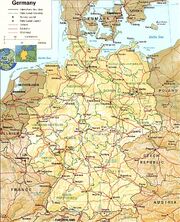
| |
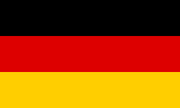
| |
| Country | |
| Continent: | Europe |
| Capital: | Berlin |
| National Language: | German |
| Government: | Federal parliamentary republic |
| Status in OTL: | Active |
The Federal Republic of Germany is a country in West-central Europe. It is bordered to the north by the North Sea, Denmark, and the Baltic Sea; to the east by Poland and the Czech Republic; to the south by Austria and Switzerland; and to the west by France, Luxembourg, Belgium, and the Netherlands.
A region referred to as "Germania" inhabited by several tribes was known and documented before AD 100. Despite the best efforts of the Roman Empire, this region was never subdued or annexed. Eventually, Germanic tribes played a role in the fall of the Roman Empire.
The Alemanni tribes give Germany its modern names in Romance languages: Allemagne in French, Alemania in Spanish, etc.
Beginning in the 10th century, German territories formed a central part of the Holy Roman Empire. This entity was devastated in the Thirty Years War in the mid 17th century, and reformed after the war centered around Austria rather than Germany. (The Holy Roman Empire name was abolished in 1806, and the entity became the Austrian Empire and then Austria-Hungary before dissolving completely in 1918.)
The modern nation-state of Germany was centered on the state of Prussia, and unified in 1871 after 65 years of three confederations. The newly formed empire quickly asserted itself in European and global politics, but the empire was shattered and the monarchy removed in 1918 with Germany's defeat in World War I. Germany was reformed as the semi-presidential Weimar Republic.
Anger at the country's war-time defeat combined with terrible economic conditions in the late 1920s saw the rise of the Nazi Party under Adolf Hitler in 1933 and the dissolution of the Weimar Republic. Hitler initiated a foreign policy intent upon placing Germany as the superpower in Europe. Hitler embraced notions of the superiority of the German "Aryan race", and the inferiority of other groups, most notably the Jews. Hitler's policy led to World War II and the Holocaust, and in turn led to Germany's absolute defeat in 1945.
In 1949, Germany was divided into two separate states — East Germany and West Germany — along the lines of Allied occupation, with the Soviet Union dominating the East, and the Western Allies, the United States in particular, dominating the West. The two states were reunited into a federal parliamentary republic in 1990. Germany has become the most populous country in Western Europe and has one of the largest economies on the globe.

The flag of Germany since 1990. It was formerly the flag of the Weimar Republic and West Germany.
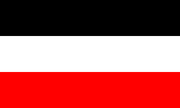
The flag of the German Empire, which was used from 1867-1918 and from 1933-1935 as a co-national flag alongside the swastika flag in OTL; it remained in use after those times in Southern Victory, Curious Notions and "Uncle Alf". In The War That Came Early, this flag was restored in 1944.
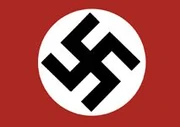
The Nazi swastika, used as the German flag from 1933-1945. In a number of Harry Turtledove works, the flag remained in use after 1945, and even into the 21st Century. In The War That Came Early, the Nazis are overthrown in 1944, and the swastika was replaced with the flag of the German Empire.
Literary comment
The vast majority of Harry Turtledove works involving Germany depict a version of the Third Reich. A smaller number depict a version of the Kaiserreich. The Weimar Republic has never been a Turtledove setting, but is often referenced in stories involving the Nazis.
Germany in Atlantis
Mercenaries from a number of German states, including Hesse and Braunschweig, fought for England during the Atlantean War of Independence.
Germany in The Case of the Toxic Spell Dump
Alemania was defeated in the First Sorcerous War, but rose again under the Leader's direction to begin the Second Sorcerous War. At a great cost, the Leader's brutal regime was defeated. By the late 20th century, Alemania was a pacified nation known as a manufacturer of minisingers.
Germany in "The Catcher in the Rhine"
While traveling through Germany, a young American tourist encountered the mythical dwarf Regin Fafnirsbruder, who transported the young man to the past, and ordered him to "save" the enchanted Valkyrie Brunhild.[1]
Germany in "Christmas Truce"
Soldiers from the German Empire participated in the Christmas Day truce in 1914 that brought the Great War to a halt for the day. Unfortunately, a Gefreiter named Adolf Hitler became enraged by the fraternization, and killed British officer in an attempt to end the truce. Hitler and was promptly killed by British lieutenant Bill Meadows. The German officer present, Franz Wormser was able to keep the truce going with Meadows' help, despite the tragedy.[2]
Germany in Crosstime Traffic
In the home timeline, Germany was a member of the European Union. There were several alternates where Germany had won World War II. These were deemed particularly terrible. In some of them, the Axis had conquered the United States. The Crosstime Traffic employee Eduardo Caruso considered these alternates to be "only slightly worse" than one in which the Soviet Union won the Cold War.[3] In one of these alternates, Nazi Germany was responsible for starting a devastating nuclear war.
Germany in Curious Notions
In the alternate designated "3477" by Crosstime Traffic, Germany emerged victorious from the brief war of 1914 when the Schlieffen Plan proved a complete success, in no small part because Russia mobilized against Germany more slowly than it had in the home timeline. Stronger German forces wheeled around behind Paris, knocking France out of the war and Great Britain soon after. Russia was subsequently smashed, and broke up into smaller entities. Germany annexed various territories and created several puppet kingdoms, including Poland, Finland, Courland, and the Ukraine.
In the late 1930s, France and Britain initiated another war, but that was quickly snuffed out, and Germany proved to be the absolute ruler of Europe. Russia did not participate in this second war as it had never reunified after 1914. Germany turned its eyes to the United States, which watched Europe with great anxiety. By the late 1940s, Germany had developed the atomic bomb. In 1956, Germany attacked and defeated the United States, and instituted an occupation that was still in effect 150 years later.
Germany maintained its rule by keeping a tight lid on technological advances. Thus, when Paul and Lawrence Gomes, father-and-son employees of Crosstime Traffic and denizens of an alternate timeline opened the store Curious Notions in San Francisco, the German authorities took notice. The store sold technology that, while obsolete in the Gomes' home, was above anything available to the average American. The store also caught the eye of the Chinese-American Triads operating in the city.
This timeline was viewed by all Crosstime employees as a particularly bad one, though comparatively "less nasty" than another timeline, one in which Nazi Germany won World War II.
Germany in The Disunited States of America
Much as the United States failed to establish themselves as a country, the German states never unified. In the late 21st Century, this left Prussia as the largest and most powerful of the numerous German-speaking states of Central Europe. Many Germans formed North American colonies, where they fought on behalf of Prussia against their pro-British neighbors during the Great War.
Germany in The Gladiator
Germany was divided between the victorious Allied Forces after World War II. When the Soviet Union won the Cold War in the 20th century, West and East Germany were reunified under a single communist government.
While Germany was one of the countries most devoted to Marxism, the Soviet Union nonetheless kept a tight control on Germany, a country that had invaded Russian territory twice in a generation.
The Germans made the Trabant automobile, which was notorious for its dirty emissions.
Germany in In High Places
The Germanies were a set of independent provinces and kingdoms sharing a common language and culture. In the 14th century the Great Black Deaths wiped out 80% of the population in the Germanies along with the rest of Europe.
Like the Kingdom of Versailles, the people of the Germanies believed in the New Revelation of Henri. The Germans made the sign of the wheel in the opposite direction, which proved to their French cousins just how stupid Germans were.
Due to the many wars among the disparate states in the Germanies, interregnums were common into the late 21st Century.
German men wore tight breeches and rimless hats.
See also
- Germania (Gunpowder Empire) for Germany in Gunpowder Empire.
Germany in Days of Infamy
Germany was locked in a death-struggle with the Soviet Union when its ally Japan invaded and occupied the American territory of Hawaii in December 1941. Days after the initial attack, Germany declared war on the United States. German U-boats' harassment of U.S. shipping in the Atlantic benefited Japan's position in the Pacific to some extent, but ultimately, Germany gave little aid to Japan's war-effort.
Germany in "Drang von Osten"
In 2041, Germany led a coalition of various European countries to meet China's invasion of Russia the same year. While the coalition was initially successful in meeting the invasion in European Russia, by 2043, the German lines were collapsing, and Chinese troops were making their way into Ukraine.[4]
Germany in "The Garden Gnome Freedom Front"
Most of the garden gnomes of Saint-Clément, Normandy, were manufactured in Germany, but considered themselves naturalized French gnomes.
In the 20th century, the humans of Europe fought World War I and World War II. Otto, a German-made gnome of Saint-Clément, sympathized with his adopted France rather than his native Germany in the first war, and actively intervened against a German soldier in the second. The reports provided by the former Garden Gnome Freedom Front suggest that numerous other gnomes took similar action under like circumstances during that war.
Germany in The Guns of the South
The America Will Break men spoke to each other in a strange guttural language which caused some Confederates to believe they were Germans. However, Avram Goldfarb, a native of German Kingdom of Prussia, examined a book written in their language, and found that it was not German, though it closely resembled it. This and other captured documents indicated that the AWB men admired certain German figures and institutions from their 20th century's history, including a disagreeable man named Adolf Hitler.
Germany in The Hot War
Germany was divided between the Western Allies (the U.S., the U.K., and France) and the Soviet Union after World War II, yielding two new states, West Germany and East Germany. However, when World War III broke out in February 1951, the Soviet Union's primary goal was to occupy and reunify Germany under communist rule.
The war ended in July, 1952 with the status quo antebellum restored. West Germany was completely smashed by the fighting, whereas East Germany was only moderately bombed.
Germany in "The House That George Built"
So great was H.L. Mencken's admiration for Germany that he severed his ties with the Sun papers in 1915 over their support for England against Germany during World War I. He did the same thing in 1941 during World War II.
Germany in In the Presence of Mine Enemies
By the 21st Century, Germany was the dominant superpower of the world and its Greater German Reich was the largest land empire the world had ever seen. Its capital was Berlin, one of its largest cities.
History
During the Second World War in the 1930s to 40s, under the rule of Adolf Hitler, the Reich and its Axis allies defeated the United Kingdom, France and the Soviet Union and divided all of Europe, Africa, Asia and part of the Pacific Ocean among themselves. During the Third World War of the 1960s to 70s, the Reich (now under the rule of Heinrich Himmler) and Japan subdued the United States which had remained in neutral isolation during the earlier war.
The vast territories formally annexed as part of the Reich included Germany's boundaries, Britain, the Low Countries, and nearly everything eastward from there, through the former Poland and Soviet Union, deep into Siberia, the Caucasus, and India. Most of Africa (including former British, French and Belgian colonies) was also an integral part of the Reich.
In addition to the Reich itself, the "Greater Germanic Empire" included two other sub-categories: occupied but not formally annexed countries, including France, the USA, and Canada, and; "allies", including Sweden, Finland, Spain, Portugal, Hungary, Romania, Bulgaria and the Italian Empire. Allies outside Europe included South Africa, Argentina and Brazil. Several of Germany's allies (Italy, Spain, and Portugal) had sizable empires in Africa and in the Middle East. However, these allies still received a great deal of input from Germany. Only Japan ruled a truly independent empire, encompassing much of Asia and the Pacific.
The Reich espoused racist views and the "superiority" of the Aryan race. All inferior races considered Untermenschen like Jews, Slavs, Roma, Arabs, Negroes and homosexuals were exterminated and/or enslaved.
However, by 2010, the Reich was growing far too dependent upon its Empire, and stagnating at multiple levels. When Führer Kurt Haldweim's health appeared to be on the decline, Germany felt the rumblings of discontent in the United Kingdom. While the country had been ruled by the British Union of Fascists since the 1940s, British Fascist Charlie Lynton began agitating for more a democratic approach to party politics. During a BUF convention in 2010, Lynton's faction was able to reintroduce elements of democracy back into the party, changing its party rules to allow the membership to elect its leaders. This move was predicated largely on the strength of the First Edition of Mein Kampf, Hitler's manifesto and one of the most revered works in the German canon.[5]
Upon Haldweim's death, the newly appointed Führer, Heinz Buckliger, began a process of reform. His first act upon his rise was to give a speech to prominent Party leaders at Nuremberg. While the text was kept from the German people, rumors quickly circulated that Buckliger had denounced certain of the Reich's past actions as criminal.
Buckliger seized upon the democratic ideas offered by the First Edition of Adolf Hitler's Mein Kampf to reintroduce the notion of representative government to the empire. In his first televised speech, Buckliger eschewed a Party uniform in favor of a plain gray suit. He lamented the dependence of the German economy upon the annual monetary tributes levied against occupied and annexed territory, and took steps to remedy this problem. For example, Buckliger recalled one division of German troops back from the United States, and reduced the tribute the U.S. paid to Germany.
Closer to home, the Dutch began demanding more national independence. Several Dutch demonstrators protested on the Adolf Hitler Platz, yelling the slogan Vrijheid (Dutch for Freedom and close to the German Freiheit) and carrying their flags. They were rounded up and arrested by the Security Police. However, they were not summarily executed as had been the custom.[6]
Naturally, Buckliger faced opposition at home. While Buckliger toured Scandinavia in 2011, Reichsführer-SS Lothar Prützmann, the head of the SS, acted behind the scenes to discredit Buckliger by ordering the publication of an op-ed piece entitled Enough is Enough. Alternatively, Rolf Stolle, the Gauleiter of Berlin, gave a speech that at once complimented Buckliger for his planned reforms, and attacked him for not being ambitious enough.
Buckliger took both of these attacks in stride, meeting them in moderate tones, and exhorting the people to continue on the path he'd set them on. Shortly after he returned from abroad, Buckliger gave a speech at Friedrich Wilhelm University, where he proclaimed the Reichstag a mere rubber-stamp for the Reich, that there would be free and fair elections to be held on 10 July 2011.
Events came to a head when Prützmann (under the guise of the State Committee for the Salvation of the Greater German Reich) initiated a Putsch in 2011. The SS placed Buckliger and his wife, Erna under house-arrest in their vacation home in Croatia. Minor bureaucrat Odilo Globocnik was made Führer. The Wehrmacht quickly sided with Buckliger. Global opinion also decried the putsch, and the German people took to the streets to protest the SS.[7] Moreover, Rolf Stolle defiantly and bombastically refused to be arrested, gathering the people of Berlin to his banner. While popular support was already against the SS, rumors that Prützmann was Jewish expedited the putschs' collapse. Prützmann committed suicide, Globocnik was beaten and killed by an enraged mob, and the Wehrmacht moped up the putsch. Stolle became a national hero. Upon his return, Buckliger's relationship with Stolle changed. The Führer no longer had the stature in the eyes of the people, and Stolle had more legitimacy.
Sunday, 10 July 2011 saw the largest voter turnout the country had known in decades. With the people mobilized, the reformers won the majority, and the Reich took the first steps on the slow march to reform.
Government
Hitler's vision for a strong Aryan race and German supremacy required a government comprising an extensive and oppressive bureaucracy led by the führer. By the early 21st century, Germany had agencies for every facet of the Reich, some of which overlapped in their responsibilities.
The führer served as both head of state and government for the Reich. The führer was the absolute ruler of the country, and enjoyed absolute obedience, irrespective of who actually held the office.[8] Despite their substantial power, the führer did designate a successor. Instead, officials within the government selected a new führer upon the death of the incumbent.[9]
As its name implies, the Air and Space Ministry was responsible for air and space travel. This included manned tripped to Mars,[10] and planned trips to Jupiter.[11] Hermann Göring was the first de facto head the ministry. His influence was so dominant that the headquarters of the Air and Space Ministry was still known as the Reichsmarschall's Office in 2010, almost 50 years after his death. The roof of the Ministry was covered in elaborate gardens and grass, as a venue for his notorious orgies.[12]
The Justice Ministry was probably the most feared agency in Germany.[13] It oversaw the Security Police, including the SS and the Gestapo.
The Colonial Ministry was responsible for administering the most of the non-European territories the Reich, such as the farming villages of the Ukraine, the mining colonies of central Africa, and cattle herders in North America.[14]
Conversely, the Foreign Ministry was responsible for relations between Germany and its allies, but also between the Reich and the annexed and occupied governments that made up the empire.[15]
The Ministry of Propaganda controlled how all information was relayed in the Reich. This included news broadcasts and news broadcasters.[16]
Other notable ministries included the Interior, Transportation, Economics, Food,[17] and Heavy Industry.[18]
Education
The Reich's education system was completely subordinate to the Nazi ideology at every level. Grammar school required students to regurgitate "facts" that usually emphasized the grandeur of the state, the supremacy of the German race, and the "inferiority" of the Jews. Compliance with the state was deeply ingrained in students as they advanced through the grades. Poor students were subject to corporal punishment.
At the university level, things were much the same. Friedrich Wilhelm University was home of the Institute of Racial Studies, which classified Jews, Gypsies, Slavs, Arabs and Blacks as inferior while Persians and Indians were classified as Aryan.[19]
List of Known Countries Part of the Reich
- Afghanistan
- Austria
- Czechoslovakia/Bohemia and Moravia
- Denmark
- India
- Iran
- Norway
- Poland
- Russia
- United Kingdom
- Yugoslavia
List of Known Occupied Countries Part of the Reich
Germany in "In This Season"
Germany overran the western part of Poland in 1939, and ruled the occupied territory harshly. This was the situation in which Berel Friedman found himself, at the time when his Chanukah "guest" arrived.
Germany in Joe Steele
Adolf Hitler's rise to power in Germany was concurrent with the rise US President Joe Steele. The two shared a deep and abiding hatred of each other for most of the 1930s.[20] Ironically, Steele used a number of tactics used by Hitler as part of his own reign. Steele used Hitler and Nazism as tools to denounce his enemies; investigations of Steele's critics very often turned up "ties" to Hitler.[21][22].
In March 1936, Hitler remilitarized the Rhineland.[23] Steele condemned Germany's move, as well France's failure to respond. Hitler thumbed his nose at Steele, proclaiming that Steele had never been told that the U.S. did not have the right to fortify its own borders. Steele, clearly enjoying the essentially meaningless back-and-forth, reminded Hitler (and the world) that the U.S. border with Canada was 3000 miles long and completely unfortified, proving that trust counted more than fortifications.[24]
In March 1938, Hitler ordered the annexation of Austria,[25] and immediately began making claims on the Sudetenland of Czechoslovakia.[26] Despite loud support from Steele and Soviet leader Leon Trotsky (who loathed each other more than either loathed Hitler), France and Britain, rather than fight Hitler, brokered a deal in which the Sudetenland was granted to Germany in September 1938.[27] Six months later, Germany annexed Bohemia and Moravia and created the independent Republic of Slovakia; Germany was now positioned to move on Poland, a situation the world at large was painfully aware of.[28]
Hitler now turned his attention to the Polish Corridor. Leon Trotsky, realizing that France and Britain could not be counted on, sent his foreign commissar, Maxim Litvinov to Berlin to negotiate a non-aggression pact with Litvinov's German counter-part, Joachim von Ribbentrop.[29] (Some found it ironic that the Jewish Trotsky had sent the Jewish Litvinov into the "world's capital of anti-Semitism."[30]) Germany invaded Poland a week later, setting off World War II.[31] The Soviet Union attacked Poland from the east a few weeks after that.[32]
While the U.S. remained neutral, Steele grew alarmed by Hitler's substantial successes from September 1939 through May 1940. When Germany defeated and occupied France, and forced British troops off the Continent, Steele realized that now only Britain stood between the U.S. and Germany in the Atlantic Ocean. He decided to supply Britain with arms and money.[33]
In early 1941, Germany invaded North Africa, Yugoslavia and Greece in order to save Italy's floundering efforts.[34] In June, Germany invaded the Soviet Union, shredding the previous non-aggression pact. While many predicted the Soviets falling out of the war in six weeks, instead, they dug in and fought.[35] With prodding from Churchill, Steele began aiding Trotsky. While Hitler protested, he did not go to war with the U.S.[36] The German advance captured Kiev and Smolensk, but the fall rains reduced Russian roads to mud, effectively halting the advance.[37]
On 7 December 1941, Japan, Germany's nominal ally, attacked the U.S., prompting the U.S. to declare war on Japan on 8 December. Three days later, Germany declared war on the U.S.[38] Germany began seeing a series of reversals the following year. The Soviets met German forces at Trotskygrad, held them, and were able to cut those forces off in the fall, prompting Steele to commend the Soviets on striking the Nazis a heavy blow.[39] A few days later, U.S. General Omar Bradley led the landing of US and British troops in North Africa, driving the German forces out of Egypt through Libya. While the plan had called for a complete capture of German troops, the Afrika Korps were able to fall back to Tunisia.[40]
Things were even worse for Germany in 1943. The remaining German troops in Trotskygrad surrendered. However, the German military decided to let the Soviet advance exceed its supply line, and launched a counter-attack, again putting the Soviets on the defensive.[41]
In 1944, the end of the war was in sight. General Bradley oversaw the successful invasion of Normandy, thereby opening the long anticipated second front in Europe.[42] Paris fell to the Allies quickly thereafter. The Soviets' drive prompted Finland and Bulgaria to exit the war, and Romania to change sides. While Germany was able to overrun Slovakia and Hungary, and to hold a line in Italy, the writing was on the wall.[43]
Germany was able to hold out until May 1945, when, with two armies bearing down on Germany, Hitler committed suicide (it was initially reported that Hitler had died fighting the Russians). Shortly after his death, Germany surrendered unconditionally.[44] Germany was divided up among the victorious allies, eventually birthing two separate states: West Germany was established under the direction of the U.S., and East Germany, which was created by the Soviet Union.[45]
The two German states remained points of controversy in the tense political atmosphere that developed after 1945. After Steele's death in March 1953, U.S. officials were concerned that the Soviet Union might make a move in West Germany, but nothing happened.[46]
Germany in "The Last Article"
Germany defeated the United Kingdom in 1941 and had conquered all of Europe and the Soviet Union by 1947 when the Nazis added India to their empire. Germany was in the process of organising trade with Japan while supporting Vichy French forces in Africa against American backed Free French forces.
It was generally believed that Germany and Japan's next target would be the United States.
Germany in "A Late Symmer Night's Battle"
Germany was the native land of kobolds. One kobold tribe left Germany to run a mining operation in northern Greece. Evicted by local humans, they turned their eyes to the Faerie kingdom ruled by Oberon and Titania.
Germany in The Man With the Iron Heart
In the immediate aftermath of World War II, Germany was divided up among the "big" four triumphant Allies: the United States, the Soviet Union, Britain and France. Each country administered its respective occupation zone with minimal input from the other three. Tensions were especially strong between the Anglo-American forces and the Soviets.
However, all sides were soon confronted with terrorist actions launched by the German Freedom Front (also known as the "Werewolves"), a specially trained underground group of unrepentant Nazis organized under the direction of Reichsprotektor Reinhard Heydrich beginning in 1943. Almost immediately, the GFF began a campaign of roadside bombings, suicide bombings, assassinations, and kidnappings in an effort to drive out the Allies.
Each occupier reacted differently. The Soviet Union, having endured a long and bloody war and occupation from 1941-3, and ruled by a government known for its brutality, responded with torture, hostage-taking, and mass executions. The French, also having endured a long occupation which ended only when the US and the UK drove Germany out, and desperate to regain face, responded in a similar fashion. The British, while having demonstrated its ability to take a hard line in its colonies, took a much softer line. The US took perhaps the softest of all, initially trying various tactics (including hostage taking as well), but found itself juggling the need to maintain security and the need to maintain its ideals of freedom. Consequently, the US saw a growing desire to end the occupation within its population.
From 1946 to 1948, the GFF was responsible for several acts that slowly wore down the American people's (if not its military and its government) willingness to continue the occupation. This included: the assassination of General George Patton; the kidnapping of American soldier Matthew Cunningham (whom the Werewolves filmed pleading for his life); the death of Pat McGraw (whose mother Diana spear-headed the recall of American troops); and the prevention of war crimes trials against top Nazi officials, including the truck-bombing of the Palace of Justice in November, 1945, the radium-bombing of Frankfurt and the crashing of a cargo plane into a courthouse in the Soviet zone.
The GFF also sent truck bombs into Paris and London, which saw the toppling of the Eiffel Tower in the former and the destruction of St. Paul's Cathedral and Westminster Abbey.
While the Soviet Union was not directly attacked, various landmarks to Communism it had established in its zone were destroyed. Most importantly, most of its officers were killed on New Years' Eve, 1945 when a Werewolf poisoned their celebratory liquor with wood alcohol.
Throughout 1946 and 1947, the tenacity of the GFF and the apparent helplessness of the Allies to stop them wore down the American public. In 1946, the electorate returned the Republican Party to power in Congress. In 1947, American troops were able to finally track down and kill Reinhard Heydrich. He was immediately succeeded by Joachim Peiper, who launched a series of hijackings aboard passenger planes. The House of Representatives refused to fund the continued occupation of Germany, leaving the US military no choice but to withdraw most of its forces.
With the Americans gone, the die-hard Nazis began their plans to return to power in western Germany. However, the USSR, knowing full well the consequences of withdrawal, were prepared to hold onto eastern Germany.
Germany in "Must and Shall"
Germany provided clandestine help to rebels in the American South (unreconciled to their defeat in the Great Rebellion nearly eight decades before) during both World Wars in an attempt to keep the US government busy at home and unable to intervene in European affairs.
Germany in "News From the Front"
Germany's efforts during World War II were benefited by the American media, which was very hostile to President Franklin D. Roosevelt in 1941 and 1942.
Germany in "The Phantom Tolbukhin"
Germany defeated and occupied the Soviet Union during World War II. But even as late as 1947, the German army had to deal with guerrilla forces, the most notorious being Fedor Tolbukhin, nicknamed "The Phantom".
Germany in "Ready for the Fatherland"
Germany was able to negotiate a separate peace with the Soviet Union after General Erich von Manstein shot and killed Adolf Hitler on 19 February 1943. Manstein became Germany's leader and oversaw the consolidation of its power in Europe, repelling the Allied invasions of Italy and France. In 1953, an exchange of sunbombs in Japan nearly brought the United States and the Soviet Union to war. Manstein was able to mediate a ceasefire. Joseph Stalin's timely death also helped diffuse the situation.
In 1979, as the Soviet Union threatened British oil resources in the Middle East, Britain opened up a dialogue with Germany, which was making claims to oil in the North Sea. At the behest of the German government, the British secret service helped the government of Croatia capture a Serb partisan, in exchange for unfettered access to the North Sea oil.
Germany in "Shtetl Days"
Under the rule of the Nazi Party, the German Reich emerged triumphant from the War of Retribution in the first half of the 20th Century, and soon imposed its will upon the globe. It systematically eliminated all of the world's Jews, making thorough records of Jewish culture as it did.
In the mid-21st Century, Germany established a variety of shtetls as tourist attractions. The shtetls were meticulous recreations of the villages the Reich had wiped out a century before. The Reich also hired historical re-enactors to reside in these villages and play the part of Jews. The commitment of the re-enactors to their craft was such that they learned Yiddish, Hebrew and Aramaic, studied the Talmud and the Torah, and soon, came to see themselves as Jews first, rather than Germans. In this way, the German Reich resurrected its long vanquished "enemy".
Germany in Southern Victory
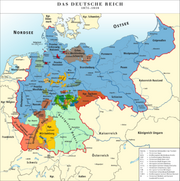
Map of the German Empire
Germany had unified around Prussia by 1870, following a series of wars, including with its neighbor France. After the United States was defeated by the Confederate States, Britain, and France in the Second Mexican War (1881-2), Germany developed an important alliance, later known as the Central Powers, with the U.S.A. The United States emulated German military and social organization (people had to line up for manufactured goods and coal, universal conscription was established, and bureaucracy became rampant) to make itself better able to oppose the Confederacy.
The Great War
Under the rule of Kaiser Wilhelm II, Germany supported Austria-Hungary against first Serbia and then Russia following the assassination of the Austro-Hungarian prince Franz Ferdinand, an act that triggered the various alliance systems put in place across Europe and North America, and the Great War began.
During the war, the Germans developed numerous weapons innovations, including poison gas and a variety of aeroplanes. They shared these with the United States, which in turn taught Germany to build barrels, helmets, and light machine guns. Germany also supported the Russian Revolution and the separatist uprising in Ireland, and established a state in Poland on former Russian territory.
Following several years of stalemate, Germany defeated France and, with help from the US, Britain. It thus established itself as the dominant power in Europe, occupying Belgium and the Ukraine, annexing the former French province of Lorraine and the Belgian Congo. It recognized the Republic of Quebec, a new nation the US had carved out of defeated Canada.
Interwar Years
Its period of dominance was short-lived, however, and was marked by elevated tensions with the US. The two victors cooperated in a joint naval operation to block British interference in the Republic of Ireland, but throughout the 1920s many people from both countries believed that a US-German conflict was not out of the question.
While tensions with the US eased during the 1930s, Germany suffered a string of setbacks in Europe. The Germans were unable to prevent the hostile Action Francaise from coming to power in France or the Silver Shirts from joining the ruling Conservatives in Britain. Bolshevik revolutionaries in Russia were crushed by loyalists of Tsar Nicholas II, Austria-Hungary grew increasingly unstable, and strong Anglo-French support for the Nationalists allowed them to triumph over the German-backed Monarchists in the Spanish Civil War.
When Kaiser Wilhelm II died in 1941, his son Wilhelm III faced a renewed war with the revitalized Entente. Wilhelm III's perceived weakness encouraged the British and French to invade Belgium and Alsace-Lorraine, and within a matter of weeks the ensuing war had spread to Eastern Europe and North America.
The Second Great War
In the first year of the war, Germany suffered a number of military setbacks: Anglo-French forces drove the Germans out of Alsace-Lorraine and Belgium, and invaded the Netherlands, reaching the Rhine and the North German Plain, while much of the Ukraine was lost to the Russians. Within a few months, Germany had managed to stabilize its various fronts and had successfully repelled a British invasion of Norway.
By 1943 Germany claimed to have driven British forces back over the Dutch border. The Germans also recaptured most of the Polish, Ukrainian, and Baltic territory seized by Russia in the opening stages of the war. By the end of the year, the Germans had defeated the Russians east of Kiev and begun the reconquest of Belgium.
As 1943 drew to a close, Kaiser Wilhelm broadcast a warning to Russia and her western allies to surrender or face "unprecedented destruction," an oblique reference to the German superbomb program, by far the most advanced in the world. It was able to draw upon the talents of Albert Einstein and Denmark's Niels Bohr, as well as the best and brightest of the German and Austro-Hungarian physics community. Their skill was confirmed in the spring of 1944 with the destruction of Petrograd, the Russian capital, the first use of a superbomb in warfare. Their efforts also produced a secret dossier transported across the Atlantic by U-boat in November 1943 to a waiting U.S. destroyer escort. This jump-started the lagging U.S. superbomb program, although not by enough to beat the Confederates to the first use of such a device in North America.
Once again, the Kaiser broadcast a surrender demand. Despite the loss of his capital, the Russian Tsar again refused, backed by Britain and France. Though initially reluctant to drop a bomb in the west (where prevailing winds would blow radioactive fallout back into Germany), the German air force bombed Paris, killing the French king and melting the Eiffel Tower into a stump. The Russian government, its capital lost, its armies disintegrating, and under pressure from a Japanese ultimatum to evacuate several of its Siberian provinces, realized that no more help would be forthcoming from its Western allies on the continent. After dithering for several weeks, the Tsar asked the Kaiser for an armistice. The collapse of both France and Russia provoked the British, whose own uranium program had finally borne fruit (embarrassingly, their Confederate clients had built and used a superbomb before them) to destroy Hamburg.
The German response would wait until June, when three superbombs were dropped near-simultaneously on London, Brighton, and Norwich, along with a broadcast warning that Germany had more bombs and would use them. Prime Minister Winston Churchill, who had fled London along with the British royal family after the Hamburg bomb, boasted that Britain would take immediate vengeance. He sent Britain's second superbomb on its way into Germany, but the plane was shot down over Belgium by German turbo-powered night fighters. Having no more bombs in its arsenal, the Churchill government fell and Britain sued for peace, as did France in turn. With her western foes essentially eviscerated, Germany's attentions for the latter half of the 20th Century turned back to Russia. Fearing its longtime foe might develop its own superbomb, Germany agreed to the doctrine formulated by U.S. President Thomas Dewey, in which both countries would police the world to prevent other countries from obtaining their own superbombs.
Germany in Through Darkest Europe
On paper, Germany was a united empire. In fact, however, the Emperors had no power, and the disparate German states remained autonomous in practice.
Italians traditionally regarded Germans as savage and uncouth, a cultural quirk which worked to the advantage of the government of the Grand Duchy of Italy in 2018. When a number of Germans were among the Aquinists who incited violence throughout Italy, the government put out propaganda linking Aquinism with Germanness.
Germany in The Two Georges
The German States continued to squabble among themselves into the late 20th Century and had never unified into a European, let alone world, power. Instead they remained a mishmash of separate kingdoms, principalities, duchies, archbishoprics, and free cities. Germans were known for their music, beer, heavy food and heavier philosophies. In the 1990s, the Russian Empire sought to dominate the Germanies.[47]
An American alternate history novel entitled The United Colonies Triumphant depicted a very different history in which Germany united, became a major world power and fought a great war with other European powers. In this fictional war, the North American former colonies of Britain came to Britain's aid, saving it from Germany. It was considered an entertaining but rather far-fetched and improbable speculation. Colonel Thomas Bushell of the Royal American Mounted Police found the novel's writing style to be poor, and considered the idea of Germany being united under a single malign ruler to be absurd.[48]
Germany in "Uncle Alf"
Germany defeated the Entente powers in the Great War of 1914, when General Alfred von Schlieffen successfully implemented his plan for a two-front war. Germany occupied both France and Belgium immediately afterward, a situation which still persisted in 1929.[49] In 1916, Germany came to the aid of its former enemy, Russia, helping to put down a communist revolution.[50]
Germany in The War That Came Early
Under the rule of Adolf Hitler and the Nazi Party, Germany had spent the period from 1933-1938 pursuing an aggressive, racially-based foreign policy designed to restore German military greatness and the unification of all German peoples. By 1938, Germany had began rearming, in violation of the Treaty of Versailles, had formally annexed Austria, and began demanding the Sudeten region of Czechoslovakia. In addition, Germany and Italy had been men and arms to the Nationalist faction of the Spanish Civil War. Hitler viewed Nationalist leader Marshal José Sanjurjo as a kindred spirit.
While the other powers of Europe were alarmed by Nazi Germany's aggression, there was little will to confront Hitler in Britain and France. The Soviet Union under Joseph Stalin seemed more inclined to fight. Stalin supported the Republican faction of the Spanish Civil War openly, whereas France and Britain paid the Republicans lip-service and little else.
In September 1938, it appeared that once again, Germany would be appeased, as British Prime Minister Neville Chamberlain and French Premier Edouard Daladier met in Munich with Hitler and Italian Prime Minister Benito Mussolini (one of Hitler's main foreign allies) to enter into an agreement which would give Germany the Sudetenland. The meeting was interrupted by news that Konrad Henlein, a political leader of the Germans in the Sudetenland, had been assassinated by a Czech nationalist named Jaroslav Stribny. Hitler, who had actually wanted a war, not this handover of territory, announced his intention to declare war on Czechoslovakia. Chamberlain and Daladier could not believe that Hitler was innocent of Henlein's death (he was in fact, innocent) and so saw no other option but war.
While Germany had been rearming, in truth it was only marginally more prepared for war than its enemies. German strategy involved bluffing the Western Allies, to help slow down their advance into Germany, while Germany subdued Czechoslovakia. After 30 days, French troops had a fragile toe-hold on German territory and British troops hadn't left France, each convinced that Germany was in a far better position for war than it was. Again, the Soviet Union was willing to directly confront Germany, landing troops in Czech territory, and launching aerial attacks. But geography thwarted a direct land engagement: Poland and Romania acted as buffers between the USSR and Czechoslovakia proper. Thus, after ferocious fighting on both sides, Czechoslovakia fell completely to Germany in 30 days.
Flush with victory, Germany now turned West. In December, all French troops had been pushed out of German territory, and German forces invaded France. Simultaneously, Germany launched an invasion of the Netherlands, then Luxembourg. An invasion of Belgium was clearly in the offing, but King Leopold III was unwilling to allow Allied forces into Belgian territory until far too late. Belgium fell, and Germany had another route into France.
After the German advance was halted at Beauvais, east of Paris, the Germans had difficulties. British Empire, French, African, and Czech troops held the line, and forced back the Wehrmacht. Soon, German troops were beginning to fall back. In the east, the tenacity of the Poles stymied the Soviets. Despite this, Hitler remained defiant, and ordered an invasion of Denmark (which, completely taken by surprise, fell in days) and then Norway (which immediately fought, with help from Britain and France).
By the end of the year Scandinavia and the East were more or less secure, but the situation continued to worsen in France where the German troops were pushed almost to the border with Belgium. Another coup attempt was launched, prompting the SS to conduct a second, more violent crackdown on the Wehrmacht that took the shooting to Germany itself and made civilians reminisce about the collapse of the Kaiser's Empire in 1918.
Hitler still stood defiant, and conducted a massive rally in Münster despite being aware that the city was a recurrent target of the RAF and the French Air Force. He refused an offer from United States President Franklin D. Roosevelt to negotiate an end to the war with a return to the status quo ante bellum, but he was careful not to anger the U.S., no mean task, as a German u-boat had sunk the luxury liner SS Athenia in January, 1939. While Germany was able to successfully blame Britain for the sinking, Hitler took additional steps, including helping American tourist Peggy Druce, trapped in Europe since the outbreak of war, to go first to Denmark and then on to neutral Sweden after Denmark fell to Germany.
In 1940, Hitler's fortunes changed dramatically (albeit temporarily) for the better when he sent his deputy, Rudolf Hess into Britain. Here, Hess was able to convince the governments of both Britain and France to end their war and arrange a new alliance where in Britain and France joined Germany in its war against the Soviet Union. Hungary and Slovakia also joined the alliance, as did Romania early the following year. Concurrently, Hitler announced plans to force the Jews in the former Czechoslovakia into ghettos.
While the coalition made substantial gains into Soviet territory in the following year, discontent in the British military led to an unprecedented coup the Spring of 1941 which deposed the pro-appeasement government of Horace Wilson. Britain then withdrew from the Soviet Union. As France remained a German ally, the British could not return ground troops to Europe, and concentrated on aerial bombings. Britain also engaged Italian forces in North Africa. As Britain gained the upper hand in the closing days of 1941, Germany's Afrika Korps entered the fray, opening a new front for Germany. In December, 1941, France, which had been seeking to exit the German alliance, completed negotiations with Britain and the USSR, and withdrew from Russia. Now Germany was again fighting in both the east and the west.
Discontent with Hitler began to grow throughout 1941. Münich was a center, led in part by Bishop Clemens August von Galen, who was critical of the Nazis' euthanasia programs. Finally, Hitler overplayed his hand when the government arrested von Galen, prompting a round of demonstrations in Münster. In the spring of 1943, another demonstration in the square outside of Münster's cathedral erupted into violence when police officers fired on the crowd. While several protesters were shot, other were able to charge the line of police, inflicting damage in return.[51] In response, the German government sent the SS into Münster, who fortified the cathedral.[52] While the people of Münster publicly accepted martial law, resentment boiled just below the surface.[53]
Hitler also grew more reckless with regards to the U.S., which had been attacked by Japan in January 1941. Despite this war, the U.S. continued to ships arms to Britain, France, and the USSR. Hitler issued an ultimatum that the U.S. would suffer consequences. He further ordered that German troops were no longer to retreat on any front.
Things continued to go poorly for Germany throughout the remainder of 1943 and into 1944. Münster continued to fester. Despite fortifications in the Low Countries, the Allies continued to press German positions in Belgium, and Soviet troops continued to move into Ukraine and Poland. Marshal Sanjurjo was killed by a sniper in Fall 1943.[54] Despite efforts to maintain his cult of personality, Hitler's popularity waned.[55]
Hitler's downfall came after a series of blunders. In the Winter of 1943, Münster began an open revolt, prompting marshal law.[56] Further, after months of tension, Hitler decided to initiate war with the United States when U-boats attacked several American merchant ships in March, 1944.[57] This prompted several military leaders to form the Committee for the Salvation of the German Nation, with General Heinz Guderian as their leader. When Hitler decided to broadcast a speech from Münster in an attempt to regain the country's trust, the group successfully assassinated him with a bomb, despite the heavy security measures the SS put into place.[58]
A civil war broke out almost immediately. Several of Hitler's would-be successors were arrested or killed. Ultimately, Guderian and the Committee triumphed.[59] Ironically, while Germany withdrew from the Low Countries, Denmark, Norway, France, and the USSR, Guderian was able to keep many of the territorial gains Hitler had made early on, including Austria, the Sudetenland, and the Protectorate of Bohemia and Moravia.[60]
Thus, unlike in 1918, Germany had not been defeated. The war ended with a draw, and with some German territorial gains as compared to the pre-1938 situation. Germany remained a major military power, with its armed forces battered but intact, and no restrictions on its further building up armaments. The German Navy embarked on producing a new and vastly improved model of U-Boat, which had not come into operation during the war. Over in the US, Albert Einstein was concerned that the far more rational military government of Germany could develop atomic bombs before everybody else, and made great efforts to get President Roosevelt to resume the halted American bomb program.
Domestically, the Committee loosened the more restrictive policies of the Nazis. News broadcasts included uncomplimentary reports about Germany and emphasized the crimes and cruelty of the SS and SD. It also quietly revoked the Reich Citizenship Law of 1935 and effectively restored citizenship to Jews, rather than treating them as residents without rights. It also removed the requirement that Jews have the yellow star of David on their clothing in public.[61]
When the Committee abolished the Nazi flag of Germany, it was replaced by the pre-1918 flag of the German Empire, rather than that of the short-lived Weimar Republic.
Germany in Worldwar
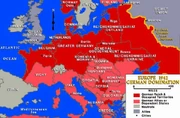
Germany's Possessions, 1942, the Eve of the Race Invasion
Germany was one of Earth's most powerful and most aggressive nations in the 1940s, ruled by Führer-Chancellor Adolf Hitler. It launched World War II by invading a number of neighboring countries and absorbing them into the Greater German Reich. When the Race's Conquest Fleet invaded Earth in 1942, it was engaged in wars with the Soviet Union, which it had invaded, and Britain, which it was fighting in North Africa. It had also declared war against the United States several months earlier, though Americans had not yet deployed against it in force. It was also practicing a genocide against the Jews; in each major city it controlled, Jewish populations were relegated to a ghetto, and mass executions were taking place in concentration camps such as Treblinka. It was a member of the Axis.
The Race recognized Germany as one of the most important Tosevite not-empires and launched simultaneous invasions of it from Poland, Italy and France. German forces initially fared very badly in the field against the superior weapons of the Race, and were driven from most of the extraterritorial gains they had made by launching a series of wars against their neighbors several years earlier. Germany's capital Berlin became the first Earth city destroyed by an explosive-metal bomb. Even then, however, the Germans managed several successes against the Race. They cooperated with the United States, Soviet Union, Britain and Japan in the Big Five.
The most important of these was a raid which Otto Skorzeny commanded and launched in conjunction with the Soviet NKVD in which radioactive plutonium was captured from the site of a destroyed Race starship. Heinrich Jäger was charged with returning the metal to Germany, but was intercepted by Mordechai Anielewicz and stripped of half of it. What remained was not enough to build an atomic bomb, but it was helpful for Germany's atomic researchers, including Werner Heisenberg.
German forces stabilized their various fronts against the Race when the Race entered German territory. They proved quite adept at exploiting the Race's main weakness, its inability to replace expended ammunition and other supplies.
Germany built an atomic bomb in late 1943 and copied the Soviet tactic of burying it underground, withdrawing from a position, and detonating it by radio when the Race took possession of the position in question. Despite retaliation from the Race with its own nuclear weapons, Germany used atomic bombs as an offensive weapon, destroying the Race-controlled cities of Rome and Alexandria using bombs carried on U-boats.
Germany's foreign minister, Joachim von Ribbentrop, took part in the negotiations at Cairo which ended the war. Ribbentrop took a very hard line in his demands: for Germany to agree to peace, the Race would need to recognize its borders as encompassing all the territories it had conquered before their arrival (he later abandoned Germany's claim to Poland for fear that it would provoke another war with the Soviet Union). Germany would also be allowed to annex Northern Italy and to protect the sovereignty of Sweden, Finland, Switzerland, Hungary, Slovakia, and Romania.
An uneasy peace prevailed on Earth for the next two decades until the arrival of the Colonization Fleet, by which time Hitler had died and been replaced by Heinrich Himmler. During this period, Germany succeeded in bringing Britain into its political orbit.
When the Colonization Fleet arrived, Germany, which the Race trusted least of all the Tosevite powers, was considered the prime suspect for launching the sneak attack against that fleet with nuclear missiles; in fact, the United States had authorized it.
Like the United States and the Soviet Union, Germany was a space-faring nation. Its Reich Rocket Force maintained a space station in Earth orbit and made regular spaceflights. It was the first nation to land a manned mission on the Moon, and also visited Mars. It built the Hermann Göring, an atomic-powered spaceship which traveled to the asteroid belt and, like the American Lewis and Clark, no doubt could have been developed into a starship had it lasted longer. The space program, a branch of the military, was commanded by General Walter Dornberger.
When Himmler died in 1965, a period of political wrangling began, during which a Committee of Eight kept a tenuous hold on political authority. This period ended when Dr. Ernst Kaltenbrunner was chosen to succeed Himmler as Chancellor.
Kaltenbrunner's short and disastrous chancellorship was marked with an unprovoked and unilateral invasion of Poland which precipitated a second war with the Race, the Race-German War of 1965. Since the Conquest Fleet's arrival in 1942, human powers had generally made an effort to keep a united front in matters relating to the Race; however, only the small nations which relied on Germany completely to preserve their independence allied with it in this war. No other nuclear-capable nation supported Germany despite concerns that allowing the Race to destroy it would weaken the position of remaining human powers in future conflicts with the Race, as their potential alliance would be that much weaker.
The war saw the destruction of Germany's military and infrastructure, though it did manage to do significant damage to the Race, especially in those areas which bordered it such as Poland and Spain. Kaltenbrunner himself was killed, and Chancellorship fell to the Reich Rocket Force commander, General Doktor Walter Dornberger, who immediately requested that Soviet General Secretary Vyacheslav Molotov mediate a peace conference. The terms of this agreement, which the Race imposed almost unilaterally, included the surrendering of all German nuclear and space technologies and the German withdrawal from and reconstitution of France.
Other human powers warned the Race that it was exceedingly difficult to enforce harsh treaties against Germany, remembering the experience of the British and French after World War I. The Race boasted that it had the patience and determination to succeed where the "Big Uglies" had failed. However, Germany began concealing nuclear weapons almost immediately, and had returned to space within a few decades; and while the Race who were supposed to ensure Germany's military in check, and like the Entente of World War I, utterly failed to lived to their so-called devoutness. By 2031, Germany was once again in a position to threaten the Race on Earth--and within a few years it was expected that it would be able to travel between the stars.
Under the ruling Nazi Party, Germany was a volatile and dangerous power which disrupted international relations across the Earth.
Countries Absorbed by the Reich (Prior to Race-German War of 1965)
 Albania
Albania Austria
Austria Belgium
Belgium Czechoslovakia
Czechoslovakia Denmark
Denmark France
France Greece
Greece Italy
Italy Luxembourg
Luxembourg Netherlands
Netherlands Norway
Norway Yugoslavia
Yugoslavia
Countries Dependent on the Reich's Protection (Prior to the Race-German War of 1965)
Germany in "Zigeuner"
During his rise to power in Germany, Adolf Hitler claimed that while his division was fighting the Russian Empire in World War I, they also had to contend with the Zigeuner people. Hitler claimed that the Zigeuner stole horses and boots and telegraph wire, helping to cause unnecessary German casualties.[62] At the same time, Hitler also saw how badly the Russians treated the Jews they found in the Austro-Hungarian provinces they overran. Hitler already hated the Russians, and their anti-Semitism left him sympathetic to the Jews.[63]
Upon his ascendancy, Hitler declared Zigeuner to be Untermenschen, along with Bolsheviks and homosexuals.[64] With the outbreak of World War II, Hitler directed the SS to round up and eliminate the Zigeuner they found in the areas under German rule. Hitler also directed Germany's allies to follow suit. Even when the war had plainly turned against Germany and its allies in October 1944, men such as SS Haupsturmführer Joseph Stieglitz oversaw the capture and deportation of a Zigeuner village near Nagylengyel in western Hungary.[65]
See also
- Germania, for Germany in timelines where the Roman Empire still exists, most importantly Give Me Back My Legions!
- Germanic tribes, the collection of ethnic groups for which Germany and Germania were named.
References
- ↑ See, e.g., Atlantis and Other Places, pgs. 124-131, HC.
- ↑ Asimov's Science Fiction, November/December, 2019, Vol. 43 Nos. 11 & 12, pgs. 50-51.
- ↑ The Gladiator, pg. 262.
- ↑ See, e.g., We Install and Other Stories, loc. 417-820.
- ↑ In the Presence of Mine Enemies, pgs. 105-108.
- ↑ Ibid., pg. 258.
- ↑ Ibid., pg. 423.
- ↑ In the Presence of Mine Enemies, pg. 117.
- ↑ Ibid., pg. 83-114.
- ↑ Ibid., pg. 85-86.
- ↑ Ibid.
- ↑ Ibid., pg. 4.
- ↑ Ibid., pg 5.
- ↑ Ibid., pg. 5-6.
- ↑ Ibid., pg. 37.
- ↑ Ibid., pg. 49.
- ↑ Ibid., pg. 5.
- ↑ Ibid., pg. 117.
- ↑ In the Presence of Mine Enemies, pg. 34-35, HC.
- ↑ Joe Steele, pg. 98.
- ↑ Ibid. pg. 106
- ↑ Ibid.
- ↑ Ibid. pg., 87.
- ↑ Ibid., pgs. 134-135.
- ↑ Ibid., pg. 195.
- ↑ Ibid. pg. 196.
- ↑ Ibid., pg. 202-203.
- ↑ Ibid., pgs. 205-207.
- ↑ Ibid, pg. 212.
- ↑ Ibid.
- ↑ Ibid. pg. 214.
- ↑ Ibid., pg. 215.
- ↑ Ibid., pgs. 223-224.
- ↑ Ibid., pg. 234.
- ↑ Ibid., pgs. 235-236.
- ↑ Ibid., pgs. 239-242.
- ↑ Ibid., pg. 243.
- ↑ Ibid., pgs. 248-249.
- ↑ Ibid., pgs. 265-267.
- ↑ Ibid, pg. 268.
- ↑ Ibid, pgs. 270-271.
- ↑ Ibid., pgs. 290-292.
- ↑ Ibid., pg. 295-296.
- ↑ Ibid. pg. 299.
- ↑ Ibid., pg. 333.
- ↑ Ibid., pg. 431.
- ↑ The Two Georges, pg. 241, MPB.
- ↑ Ibid., pgs. 239-240.
- ↑ See e.g.: Atlantis and Other Places, pgs. 341-342, HC.
- ↑ Ibid., pgs. 343-344.
- ↑ Two Fronts, pg. 358.
- ↑ Ibid., pg. 386-387.
- ↑ Ibid., pg. 387.
- ↑ Last Orders, pg. 144-146.
- ↑ Ibid., pgs. 108-109.
- ↑ Ibid., pgs. 116-119.
- ↑ Ibid., pgs. 269-70.
- ↑ Ibid., pg. 300.
- ↑ Ibid., pg. 382.
- ↑ Ibid., pgs. 318-320.
- ↑ Ibid, pgs. 382-383.
- ↑ Asimov's Science Fiction, September/October, 2017, Vol. 41 Nos. 9 & 10, pg. 94-95.
- ↑ Ibid., pg. 100.
- ↑ Ibid., pg. 99.
- ↑ Ibid., pg. 92-99.
